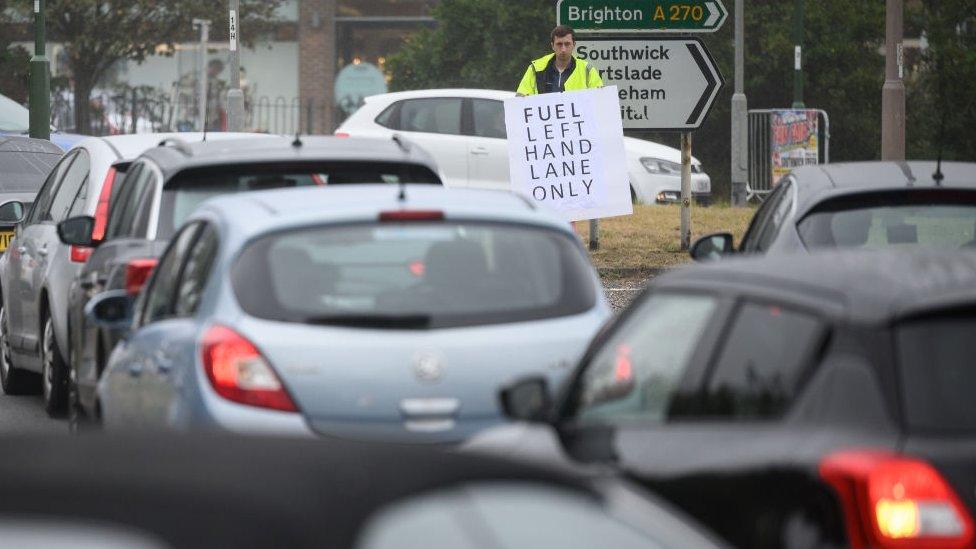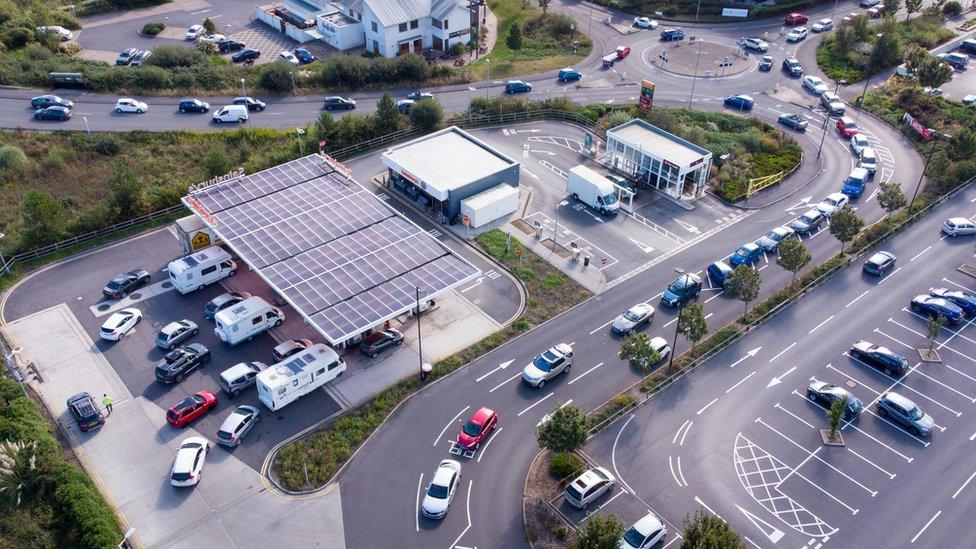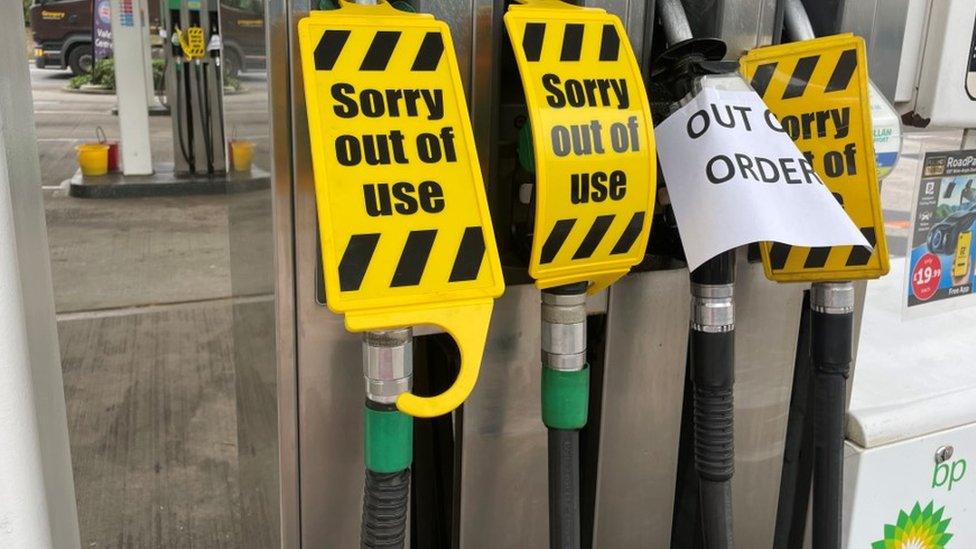Lorry driver shortage: Temporary visa scheme to run until Christmas Eve
- Published

Drivers encountered lengthy queues at many forecourts on Saturday
A temporary visa scheme to make it easier for foreign lorry drivers to work in the UK is set to run for three months, ending on Christmas eve.
It is understood about 5,000 visas may be issued, with more details about the scheme set to be announced on Sunday.
A shortage of drivers has disrupted fuel deliveries, with some petrol stations closing, and queues forming.
The government has said there is no fuel shortage at refineries, and urged people not to panic buy.
The president of the AA said panic-buying rather than supply chain issues was driving the shortage of fuel at some petrol stations.
Edmund King added that the problem should pass in a matter of days if drivers only fill up when they need it, adding "there is plenty of fuel at source".
MPs and police forces have called on drivers to be "sensible", to consider filling up another time, and to avoid stockpiling fuel in jerry cans.
One petrol station boss from Ferndale, in Rhondda Cynon Taf, appealed for calm amid continued high demand for fuel on Saturday.
Meanwhile, the continued shortage of hauliers threatens more disruption to deliveries of petrol, food and other goods.
Trade association Logistics UK estimates that the UK is in need of about 90,000 HGV drivers - with existing shortages made worse by a number of factors, including the pandemic, Brexit, an ageing workforce, and low wages and poor working conditions.
The foreign drivers eligible for visas will not be limited to the EU, but the expectation is most of the drivers will be from Europe.
A raft of longer-term measures. including training up more drivers and addressing the backlog of driving tests, are also to be introduced by ministers.
Conservative MP Tobias Ellwood welcomed the introduction of the temporary visa but said this would not help overnight.
As well as training more domestic drivers and speeding-up testing, Mr Ellwood said hundreds of Afghan refugees could be trained to fill vacancies.

At the scene: View from the pumps

Jennifer Ward, a student paramedic, had to travel to five stations to get diesel for her ambulance
Jennifer Ward, a student paramedic of three years for Medicare EMS, which provides 999 frontline support to the East of England Ambulance Service, said she had to travel to five stations to get diesel for her ambulance.
She was eventually able to use the lorry pumps at a petrol station in Chelmsford.
The 21-year-old said: "No patient care was delayed because of this, ambulances were still being sent to jobs.
"It was more the anxiety of not knowing where we can fill up when you're on three quarters of a tank, I could be sent anywhere, I could be sent to Norwich and I could have had no fuel."
Matt McDonnell, chief executive of Medicare EMS, said a member of staff cancelled their shift on Saturday because they had been unable to get fuel. Ambulance drivers were also struggling to get enough fuel for their shifts, he said.
He added: "If it carries on and gets worse we may be in a situation where we are unable to meet our contractual needs. I'm waiting to see what they [the government] will do about it, whether they will introduce what they did last year for key workers and shopping, or something like that."
Rosie Osborne, a wedding singer, was queuing for petrol in Balham Hill, south London, before travelling to a wedding in Somerset, where she will front the band.
"I'm in the red and I need to get petrol ASAP," she said. "I have been sat in this queue for 50 minutes and I didn't want to risk getting petrol elsewhere en route, but I am nearly on empty so I need to get petrol anyway."
But there was no such pressure for one driver in Leeds who says that, while she only has 21 miles left in her tank, "I'll just walk or get the bus" if she can't fill up.
One woman, who lives in York, says she had managed to get some fuel on Friday night which she needed to enable her to help her 91-year-old mother who lived in Leeds.
"She would have been stuck," she says. "It's very difficult."
Drivers react to long petrol queues: 'I'm on red and I need to get petrol ASAP'

Sainsbury's said it was experiencing "high demand" for fuel, with a "tiny proportion of sites" temporarily closed.
BP said about 20 of its 1,200 petrol forecourts were closed, with between 50 and 100 sites affected by the loss of at least one grade of fuel.
A "small number" of Esso-branded Tesco refilling stations have also been impacted, said Esso's owner ExxonMobil.
EG Group, which has 341 petrol stations in the UK, is introducing a limit of £30 per customer on all grades of fuel due to "unprecedented customer demand".
Business minister Greg Hands said fewer than 1% of petrol stations were closed and there was "easily enough petrol available for normal use at this time of year".
One petrol station in Stockport sold 5,280 gallons (24,000 litres) of fuel on Friday, compared with 1,760 gallons (8,000 litres) on the same day the previous week.

Ministers act despite political embarrassment

This isn't a particularly popular idea with many cabinet ministers.
That's because the new immigration system that came in after Brexit was all about saying to companies: "You can't rely on cheap foreign labour any more, you've got to focus on the workforce in this country, you've got to train them, you've got to pay them better wages."
Relaxing those immigration rules now undermines that message. It could lead to other sectors saying they want special treatment too.
Ministers know this situation could get very difficult, very quickly. So they do have to act - even though this is going to cause huge political embarrassment.
Labour are already saying - we told you about this, we said this should happen months ago.
Boris Johnson knows all too well his opponents are going to be very ready to say: "We told you so."

The European Road Haulers Association said temporary visas would be a "good idea" but are "only part of the solution" - and warned staying in the EU may be more appealing for drivers.
Allan Davison, managing director of Hoyer Petrolog UK - BP's transport contractor - said temporary visas were needed to ease the current problems.
Lorry drivers have said some of the conditions they face in the job were putting off younger recruits - the average age of a HGV driver in the UK is 55.

Vehicles queue for fuel at a Sainsbury's petrol station in Weymouth
A Downing Street spokesperson said: "We have ample fuel stocks in this country and the public should be reassured there are no shortages."
The spokesperson said the government was looking at temporary, time-limited measures to introduce.
"We are moving to a high wage, high skilled economy and businesses will need to adapt with more investment in recruitment and training to provide long-term resilience," the spokesperson added.

WHAT WE LEARNED FROM THE OFFICE: Secrets, facts and behind-the-scenes gossip about the beloved British comedy
WHAT TO TAKE TO UNI: The must-haves and easily forgotten essentials for starting university

- Published23 September 2021

- Published24 August 2021

- Published22 August 2021
